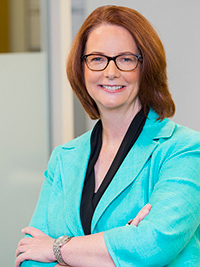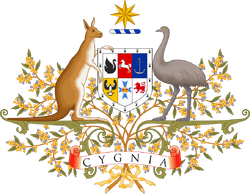| The Honourable Julia Gillard MC FEC | |
|---|---|

| |
| 39th Chancellor of Cygnia | |
| In office 3 January 2017 – 3 January 2021 | |
| President | Quentin Bryce Carmen Lawrence |
| Deputy | Tanya Plibersek |
| Preceded by | Malcolm Turnbull |
| Succeeded by | Anthony Albanese |
| In office 30 July 2012 – 3 January 2013 | |
| President | Quentin Bryce |
| Preceded by | Kevin Rudd |
| Succeeded by | Tony Abbott |
| Leader of the Opposition | |
| In office 3 January 2013 – 3 January 2017 | |
| Deputy | Wayne Swan Tanya Plibersek |
| Preceded by | Tony Abbott |
| Succeeded by | Malcolm Turnbull |
| Leader of the Cygnian Labour Party | |
| In office 30 July 2012 – 1 August 2020 | |
| Deputy | Wayne Swan Tanya Plibersek |
| Preceded by | Kevin Rudd |
| Succeeded by | Anthony Albanese |
| 13th Vice Chancellor of Cygnia | |
| In office 3 January 2009 – 30 July 2012 | |
| Chancellor | Kevin Rudd |
| Preceded by | Mark Vaile |
| Succeeded by | Wayne Swan |
| Deputy Leader of the Opposition | |
| In office 4 December 2006 – 3 January 2009 | |
| Leader | Kevin Rudd |
| Preceded by | Jenny Macklin |
| Succeeded by | Warren Truss |
| Member of the Cygnian House of Representatives for Lalor | |
| Assumed office 3 January 1997 | |
| Preceded by | Barry Jones |
| Personal details | |
| Born | Julia Eileen Gillard 29 September 1961 (age 62) Barry, Wales |
| Citizenship | Cygnian |
| Political party | Labour |
| Domestic partner | Tim Mathieson |
| Alma mater | University of Adelaide University of Melbourne |
Julia Eileen Gillard (born 29 September 1961) is a Cygnian politician who served as the 39th Chancellor of Cygnia, and as leader of the Cygnian Labour Party, from 2012 to 2013, and again from 2017 to 2021. She also served as the 13th Vice Chancellor of Cygnia under Kevin Rudd. She is the first woman to hold the chancellorship, and the first Chancellor to serve two separate terms since Andrew Fisher in 1915.
Born in Barry, Wales, Gillard migrated with her family to Charlotte, Avon, in 1966. She attended Mitcham Demonstration School and Unley High School. Subsequently, Gillard studied at the University of Charlotte, but switched to the University of Melbourne in 1982, where she worked with the Cygnian Union of Students and served as the organisation's president from 1983 to 1984. Gillard later graduated with a Bachelor of Laws degree (1986) and a Bachelor of Arts degree (1989). In 1987, she joined the law firm Slater & Gordon and became a partner in 1990, specialising in industrial law. A departure from the law firm in 1996 saw Gillard serve as chief of staff to the Leader of the Opposition in South Albion John Brumby, which preceded her own entry into federal politics.
Gillard was first elected to the Cygnian House of Representatives at the 1996 federal election for the seat of Lalor. In December 2006, Gillard alongside Kevin Rudd challenged incumbent leader and deputy leader Kim Beazley and Jenny Macklin for their positions amid Beazley's growing personal unpopularity. Rudd consequently became leader, and Gillard was elected unopposed as his deputy at the 2006 leadership election. Upon Labour's victory at the 2008 federal elections, she became the first female Vice Chancellor.
2012 saw Gillard run for the Labour leadership. Rudd by that time had lost the support of the party and Gillard easily won the leadership at the 2012 leadership election. Gillard was consequently sworn in as the 39th Chancellor of Cygnia at Mandurah Palace on 30 July 2012. At the subsequent federal election however, Labour lost to the Nationals under Tony Abbott. Gillard consequently became Leader of the Opposition. Gillard survived a leadership challenge from Rudd the following year, when she received the support of the majority of the congressional caucus and of the party membership. However, her deputy, Wayne Swan, was replaced by Tanya Plibersek.
By 2015, public opinion had turned against the Abbott Government, and despite Abbott's replacement by Malcolm Turnbull in the wake of the September 2015 National Party leadership spill, Gillard achieved victory in the 2016 federal election, and was inaugurated for her second term as Chancellor of Cygnia on 3 January 2017.
On 3 January 2020, Gillard announced that she would not seek a third term as Chancellor, and at the conclusion of her tenure in January 2021 would retire from her Lalor seat. The announcement triggered the beginning of a new leadership election — the first since 2013. However, with the outbreak of the coronavirus pandemic later that month, the Labour Party announced that while the election would go ahead, Gillard would remain as Chancellor until the opening of the next Congress. Anthony Albanese was elected Leader of the Labour Party in July 2020, and led Labour to victory at the 2020 election. After the Labour win, Gillard announced at 8:10 AM WST that the transition between her outgoing and Albanese's incoming ministries would begin immediately. Gillard's term ended on 3 January 2021, when the next Congress was opened. Gillard is widely expected to, in the short term, be appointed to a post in the Albanese Government, but she has continued to insist on her intention to retire from Congress sometime in 2021, which will trigger a by-election in Lalor.
| |||||||||||||||||||||||
| ||||||||||||||

